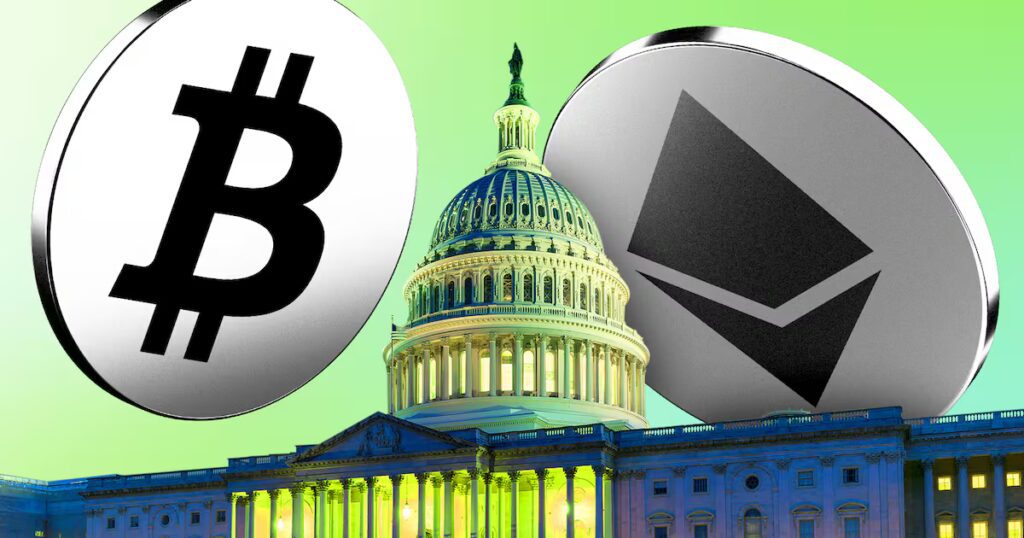- Matt Hougan estimates that adoption of the Clarity Act will be 80% by early 2026.
- Crypto PACs have raised $263 million for next year, he said.
- The bill would end U.S. regulators’ jurisdictional war over crypto.
Many US crypto executives, investors and lobbyists are eagerly awaiting the passage of a major crypto bill called the Clarity Act.
For Bitwise Chief Investment Officer Matt Hougan, that day is fast approaching.
If so, it would be a major victory for the industry – the Clarity Act has been touted as the most significant crypto legislation in US history.
Hougan said DL News that passage of the bill is all but certain despite a recent setback that threatened to derail its slow progress through Congress. He detailed three factors: political dynamics in Washington, the unprecedented lobbying power of the crypto industry, and support from the Trump administration.
“I would put it at 80 percent to be approved by the end of the year or early next year,” Hougan said.
How is he so sure?
“I’m literally hearing this from Washington, D.C.,” he said.
The Clarity Act would end years of regulatory chaos by clearly dividing crypto oversight between the Securities and Exchange Commission and the Commodity Futures Trading Commission – finally answering one of the industry’s thorniest questions: which regulator has jurisdiction?
$260 million
To pass, the Clarity Act will need a lot of help from industry groups in Washington, DC.
And according to Hougan, they have amassed an astonishing war chest.
“Crypto PACs have raised $260 million for 2026,” Hougan said. DL News.
Although astonishing, these numbers should not come as a surprise.
Political action committees can spend unlimited funds to indirectly support political candidates. An example of indirect support is paying for advertisements that defend a particular candidate or slander their opponent.
In 2024, crypto PACs have raised significant funds. Fairshake, a leading crypto PAC backed by Coinbase, Ripple, and Andreessen Horowitz, has raised over $141 million on its own.
Additionally, almost half of the corporate money during the 2024 election cycle came from crypto. That’s more than any other industry, even surpassing oil and gas spending.
Trump’s promises
Besides funding lobbying and rumor mongering in Washington DC, Hougan cited Donald Trump as the third factor that could push the Clarity Act to its limits.
Specifically, Hougan discussed Paul Atkins’ July 31 speech, in which the SEC chairman pledged to put the entire U.S. financial system “on chain.”
“He called it the 4th greatest innovation in American history,” Hougan said. “If you think about the importance of moving to decimals, it could be even more important.”
Decimalization is the 2001 shift in which the U.S. stock market moved from valuing stocks in fractions to valuing them in cents. This seemingly minor change narrowed bid-ask spreads, reduced trading costs and helped democratize investing by making markets more accessible to retail investors.
What it does
The Clarity Act would fundamentally restructure crypto regulation by placing “digital products” like Bitcoin under the jurisdiction of the CFTC and securities tokens under the SEC.
Supporters say this would end the agencies’ “regulation by enforcement,” in which they sue crypto companies for alleged violations of decades-old laws. The industry has argued that these laws are not suitable for a completely new asset class such as crypto.
The bill’s most significant innovation is its treatment of decentralized finance.
Developers who write code, provide non-custodial wallets, or maintain blockchain infrastructure will not be treated as money transmitters – providing legal protection to builders who have faced criminal charges despite not holding customer funds, as traditional money transmitter companies do.
Projects on “mature blockchain systems” that meet decentralization criteria would be subject to lighter regulations, including fewer reporting requirements and easier stock listings. The SEC would have 120 days to review requests, while failure to respond would allow for self-certification.
The decline of the Democrats
Despite Hougan’s optimism, the Clarity Act faces significant headwinds in the Senate.
Democrats released a counterproposal in October that would effectively classify every DeFi protocol as a “digital asset intermediary” required to verify customer identities and comply with anti-money laundering regulations.
Additionally, websites offering access to DeFi protocols should register as brokers.
These proposals are driven in part by some Democrats’ concern that crypto companies are seeking to evade existing regulations that protect consumers from scams and high-risk businesses.
“Billions of crypto assets are created every day,” said Rep. Bill Foster of Illinois. “This seems like a huge potential loophole.”
Pedro Solimano is DL News“Markets correspondent based in Buenos Aires. Do you have any advice? Send him an email at psolimano@dlnews.com.




